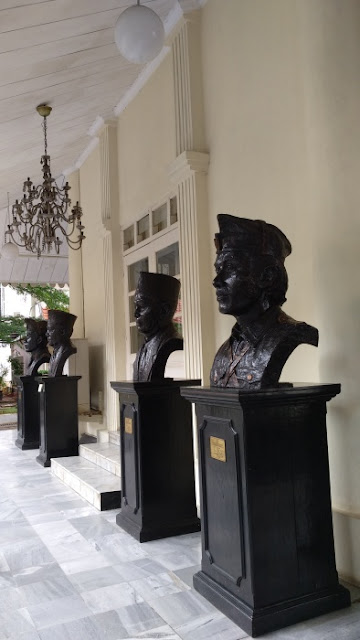Joang
45 Museum is a silent witness of the awakening and struggle of Indonesian
people. As one of the historical place in Indonesia movement, we can find and
explore the moments surrounding Indonesia independence and the struggle of
Indonesian national heroes in achieving it.
Around the 1930s, Menteng area was mere woodlands covered with spurge trees, whose Latin name is Euphorbiaceous and also known locally as Pohon Menteng. The woodlands formerly owned by an Arab and later sold to the Dutch East India government were then converted into residential areas for Dutch nationals. Complying with the development of Batavia and the rise of agricultural exports to foreign countries, a Dutch national, LC Schomper, built a hotel which he called “Hotel Schomper” on what is now known as Joang 45 Museum at Jl Menteng Raya No 31, Kebon Sirih, Menteng, Central Jakarta.
During
the Japanese occupation period, Hotel Schomper was controlled by Sendenbu,
Japan’s propagandist organization. In July 1942, the building was ceded to the
Indonesian youths who comprised, among others, Adam Malik, Sukarni, Chaerul
Saleh, and AM Hanafi. After making strenuous efforts, they made the building on
Jl Menteng 31 as a dormitory of Angkatan Baru Indonesia. Later the building was
converted into the quarters and office of Pusat Tenaga Rakyat (PUTERA) that
established on March 9, 1943, by the Japanese defence agency to accommodate and
control the Indonesian nationalist. At the request of Angkatan Baru Indonesia’s
committee members, the youths could still use the building as their quarters to
rapidly deploy their members to various regions. On March 1, 1944, PUTERA was
dissolved and changed into a new organization but maintained the task of
mobilizing the Indonesian people. The new organization called Jawa Hokokai had
its headquarters on Jl Menteng 31. But many young people had since continued
their struggle for independence outside the building.
After the Proclamation of Indonesia Independence, the youths of Menteng 31 joined the Van Aksi Revolusi Proklamasi Committee and were succeeded in regaining control of the building from Jawa Hokokai on August 23, 1945. The first program of the Committee was to immediately form the Central National Committee of Indonesia (KNIP) and to reorganize Pembela Tanah Air (PETA) and Heiho into the Indonesian People’s Army (TRI). After defeated Japan’s occupation forces dissolved PETA, the Van Aksi Committee totally changed its programs by grouping members of the armed youth organization which had been spearheaded by Angkatan Pemuda Indonesia (API) into Laskar Rakjat Djakarta Raja. The formation of the troops took place behind the Menteng 31. On November 11, 1945, Prime Minister Sjahrir declared that Jakarta had been made a Diplomatic City. Thus the Menteng 31 youths and the Jakarta troops left the building and moved to Leonilen quarters in Jatinegara and later to Bekasi, Karawang, and Cikampek.
After the Proclamation of Indonesia Independence, the youths of Menteng 31 joined the Van Aksi Revolusi Proklamasi Committee and were succeeded in regaining control of the building from Jawa Hokokai on August 23, 1945. The first program of the Committee was to immediately form the Central National Committee of Indonesia (KNIP) and to reorganize Pembela Tanah Air (PETA) and Heiho into the Indonesian People’s Army (TRI). After defeated Japan’s occupation forces dissolved PETA, the Van Aksi Committee totally changed its programs by grouping members of the armed youth organization which had been spearheaded by Angkatan Pemuda Indonesia (API) into Laskar Rakjat Djakarta Raja. The formation of the troops took place behind the Menteng 31. On November 11, 1945, Prime Minister Sjahrir declared that Jakarta had been made a Diplomatic City. Thus the Menteng 31 youths and the Jakarta troops left the building and moved to Leonilen quarters in Jatinegara and later to Bekasi, Karawang, and Cikampek.
The
building style adopted the distinctive and classical European architecture with
marble columns in the front part of the verandah and a flight of steps leading
up to the entrance door. In the middle of the building, there was a large
living room. The dining room was in the
rear part of the building, near the kitchen and godown. Near the kitchen, there
were also 3 (three) other rooms for the cooks. On both sides of the main
verandah were 2 (two) wings. The left wing had 5 (five) bedrooms while the
right wing had 8 (eight) large bedrooms, each with a private bathroom.








